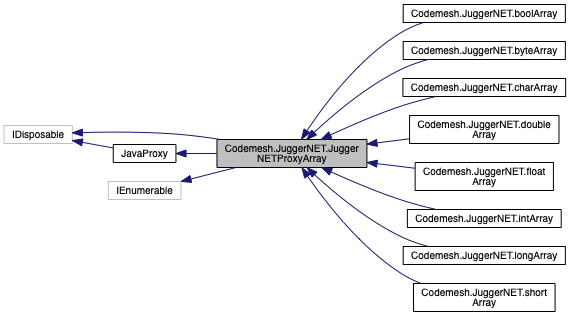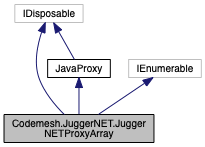The baseclass for all array types that are proxy types for Java types. More...


Classes | |
| class | Enumerator |
Public Member Functions | |
| void | Dispose () |
| Releases the corresponding Java object, thereby making it eligible for garbage collection if no other references to the same object are held. More... | |
| void | Release () |
| Releases the connection between this proxy instance and the Java object without freeing the Java object. More... | |
| override bool | Equals (object obj) |
| Implemented in terms of the Java equals() method. If the other object is not also a subclass of a JavaObject, the return value is always false. This is to ensure that the the results of a comparison is independent of the order, i.e. More... | |
| override int | GetHashCode () |
| Implemented in terms of the Java hashCode() method. More... | |
| override string | ToString () |
| Implemented in terms of the Java toString() method. More... | |
| bool | IsInstanceOf (JavaClass clazz) |
| Returns true if the instance is type compatible with the given Java type. More... | |
| bool | IsSame (JavaProxy proxy) |
| Returns true if the proxy instance wraps around the same Java object as the other proxy instance. More... | |
| virtual IEnumerator | GetEnumerator () |
| Provides the default implementation for reference type arrays. Primitive arrays override this method. More... | |
Protected Member Functions | |
| JuggerNETProxyArray (JavaMethod ctor, int size) | |
| JuggerNETProxyArray (JavaMethod ctor, JavaClass elemClazz, int size) | |
| JuggerNETProxyArray (JNIHandle jobject) | |
| object | GetElement (Type type, int index) |
| The element accessor for arrays of reference types. More... | |
| JNIHandle | GetElement (int index) |
| The element accessor for arrays of reference types that are leafs in the proxy type system. This method can dramatically enhance the performance of the element access because we can directly construct the return type through a constructor invocation rather than through using reflection. More... | |
| void | SetElement (int index, object elem) |
| The element mutator for arrays of reference types. More... | |
| void | SetElement (int index, Type elemType, object elem) |
| The element mutator for arrays of reference types that might require dynamic peer creation. More... | |
Properties | |
| long | JObject [get, set] |
| A property giving access to the JNI object handle that represents the wrapped Java instance. More... | |
| long | JObjectDuplicate [get] |
| A property representing a duplicated JNI object handle. More... | |
| HandleRef | Handle [get] |
| bool | IsFixedSize [get] |
| Always true. More... | |
| bool | IsReadOnly [get] |
| Always false. More... | |
| bool | IsSynchronized [get] |
| Always false. More... | |
| int | Length [get] |
| The number of elements that the array can hold. More... | |
| abstract int | Rank [get] |
| The rank (number of dimensions) of the array. More... | |
| object | SyncRoot [get] |
| The synchronization object for the array (the array itself). More... | |
| abstract Type | ElementType [get] |
| The .NET type of the array elements. More... | |
 Properties inherited from Codemesh.JuggerNET.JavaProxy Properties inherited from Codemesh.JuggerNET.JavaProxy | |
| long | JObject [get, set] |
| A property representing the JNI object handle. More... | |
| HandleRef | Handle [get] |
| A property representing the JNI object handle. More... | |
| long | JObjectDuplicate [get] |
| A property representing a duplicated JNI object handle. More... | |
Detailed Description
The baseclass for all array types that are proxy types for Java types.
Member Function Documentation
◆ Dispose()
|
inline |
Releases the corresponding Java object, thereby making it eligible for garbage collection if no other references to the same object are held.
◆ Equals()
|
inline |
Implemented in terms of the Java equals() method. If the other object is not also a subclass of a JavaObject, the return value is always false. This is to ensure that the the results of a comparison is independent of the order, i.e.
a.Equals( b ) == b.Equals( a )
which could not be guaranteed if we did special things for obj being of some special .NET type.
- Parameters
-
obj the object we're comparing for equality.
- Returns
◆ GetElement() [1/2]
|
inlineprotected |
The element accessor for arrays of reference types that are leafs in the proxy type system. This method can dramatically enhance the performance of the element access because we can directly construct the return type through a constructor invocation rather than through using reflection.
- Parameters
-
index the index
- Returns
◆ GetElement() [2/2]
|
inlineprotected |
The element accessor for arrays of reference types.
- Parameters
-
type the .NET type of the element index the index
- Returns
References Codemesh.JuggerNET.JavaClass.GetTypedInstance().
◆ GetEnumerator()
|
inlinevirtual |
Provides the default implementation for reference type arrays. Primitive arrays override this method.
- Returns
Reimplemented in Codemesh.JuggerNET.shortArray, Codemesh.JuggerNET.longArray, Codemesh.JuggerNET.intArray, Codemesh.JuggerNET.floatArray, Codemesh.JuggerNET.doubleArray, Codemesh.JuggerNET.charArray, Codemesh.JuggerNET.byteArray, and Codemesh.JuggerNET.boolArray.
References Codemesh.JuggerNET.JuggerNETProxyArray.ElementType.
◆ GetHashCode()
|
inline |
Implemented in terms of the Java hashCode() method.
- Returns
- The object's Java hashcode.
◆ IsInstanceOf()
|
inline |
Returns true if the instance is type compatible with the given Java type.
- Parameters
-
clazz the Java type.
- Returns
Implements Codemesh.JuggerNET.JavaProxy.
References Codemesh.JuggerNET.JuggerNETProxyArray.JObject.
◆ IsSame()
|
inline |
Returns true if the proxy instance wraps around the same Java object as the other proxy instance.
- Parameters
-
proxy The other proxy instance.
- Returns
- True if the two proxies reference the same Java object.
Implements Codemesh.JuggerNET.JavaProxy.
◆ Release()
|
inline |
Releases the connection between this proxy instance and the Java object without freeing the Java object.
Implements Codemesh.JuggerNET.JavaProxy.
◆ SetElement() [1/2]
|
inlineprotected |
The element mutator for arrays of reference types.
- Parameters
-
index the index elem the element to set into the array at the given index.
◆ SetElement() [2/2]
|
inlineprotected |
The element mutator for arrays of reference types that might require dynamic peer creation.
- Parameters
-
index the index elemType the element type to be considered during peer creation. elem the element to set into the array at the given index.
◆ ToString()
|
inline |
Implemented in terms of the Java toString() method.
- Returns
- the string representation of the object.
Property Documentation
◆ ElementType
|
get |
The .NET type of the array elements.
Referenced by Codemesh.JuggerNET.JuggerNETProxyArray.GetEnumerator().
◆ IsFixedSize
|
get |
Always true.
◆ IsReadOnly
|
get |
Always false.
◆ IsSynchronized
|
get |
Always false.
◆ JObject
|
getset |
A property giving access to the JNI object handle that represents the wrapped Java instance.
Referenced by Codemesh.JuggerNET.JuggerNETProxyArray.IsInstanceOf().
◆ JObjectDuplicate
|
get |
A property representing a duplicated JNI object handle.
◆ Length
|
get |
The number of elements that the array can hold.
Referenced by Codemesh.JuggerNET.shortArray.operator short[]().
◆ Rank
|
get |
The rank (number of dimensions) of the array.
◆ SyncRoot
|
get |
The synchronization object for the array (the array itself).
The documentation for this class was generated from the following file:
- JuggerNETProxyArray.cs